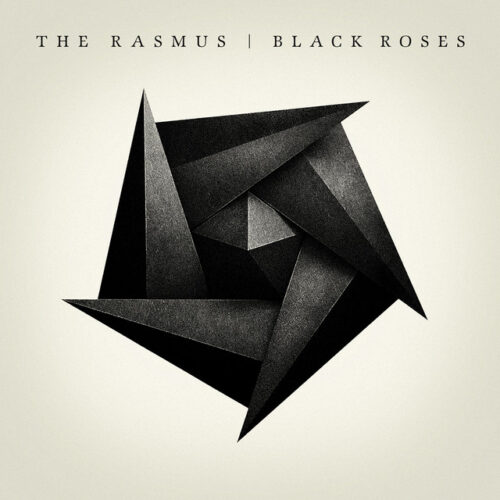HEAVY MUSIC HISTORY: Black Roses – The Rasmus
In May 2022, THE RASMUS rocketed back on to the world stage for the first time since In The Shadows made them superstars almost 20 years prior. Not because they had crafted another perfect ear worm, and not because they were finally being paid their dues for a quality career, but because they were chosen to represent Finland in the Eurovision Song Contest. The biggest night in music – sorry, Grammys – does not discriminate when it comes to genre but, for the most part, finalists are armed with numbers so upbeat they make musical theatre look like a funeral. Frisson inducing key changes, laboratory-made hooks, that sort of thing.
Maybe their Eurovision dreams explain Black Roses (2008), an album that received mixed-to-extremely negative reviews on release 15 years ago. Kerrang, a magazine not afraid of pop influenced rock bands, gave it a one-out-of-five kicking. Just five years earlier THE RASMUS had been ubiquitous; even now, In The Shadows goes down a treat with everyone who was there. Its chorus is one of the most instantly recognisable melodies to ever emerge from the murky Finnish scene, and very few rock bands have achieved that level of mass appeal in the 21st century. Understandably, but unfairly, THE RASMUS are often thought of as one-hit wonders. It is better to think of In The Shadows more as a miracle, a song in the right place at the right time. It came before EVANESCENCE’s Bring Me To Life dominated the UK singles chart and it primed a new generation of goths for the more seductive HIM, whose success in terms of recognisable songs and iconography was more sustained.
The truth is THE RASMUS have always been chasing the perfect pop formula. In another world, Guilty took the world by storm instead with its ‘guilty, woah oh oh oh oh!’ refrain. But songs like In My Life from Dead Letters (2004) and Night After Night from follow-up Hide From The Sun (2005) had a distortion pedal. Black Roses shaved off their slightest of slight edges and replaced all that barely-there crunch with 80s style synthesisers. The 80s may be all the rage now thanks to Stranger Things and countless other reboots cashing in on nostalgia, but in 2008, no one wanted to think about mullets. An already soft band were going softer, while their contemporaries in HIM were touring Venus Doom (2007), maturing alongside their fanbase with their most difficult and dark record, and EVANESCENCE had continued to ride the mainstream wave with some majestic alternative metal on The Open Door (2006).
Black Roses was misunderstood, made to play among peers it had little interest in hanging out with. You do not hire Desmond Child if the goal is to become more rugged and raw. The legendary producer and songwriter is responsible for Livin’ On A Prayer (BON JOVI), Poison (ALICE COOPER), I Was Made For Lovin’ You (KISS), and – seriously – Livin’ La Vida Loca (RICKY MARTIN). This is a record standing on the shoulders of the cheesiest of cheesy bangers, and that was the point: THE RASMUS had already proven they have what it takes to reach beyond genre boundaries.
If Black Roses has one major downfall, it is that it sounds too purposeful; every track goes down a little too smoothly, and its intended crossover appeal is a little too apparent. But one out of five? Heavens no! Livin’ In A World Without You alone is worth more than that, a song that sits alongside In The Shadows and Guilty with its undeniable chorus. Its electronica is less offensive in 2023, a time when blending genres is all the rage and something to be celebrated. The stompy Ghost Of Love melds synths with percussive power chords, you can dance to Your Forgiveness’ cymbal work, and Ten Black Roses comes armed with the kind of hooks legions of black-clad fans could scream back at the band for years to come. Their sense of gothic melodrama still lingered on Run To You, which erupts into a rainstorm refrain full of longing. More than any other song here, it would fit snugly alongside a track like Not Like The Other Girls.
Lost And Lonely ends with a classic metal twin-guitar harmony, which frontman Lauri Ylönen says was inspired by METALLICA. Maybe therein lies the problem with Black Roses. It should not be held up alongside METALLICA, or HIM or EVANESCENCE. Instead, it belongs with Eurovision-adjacent records. Heartfelt, sincere, accessible, if lacking in bite. On You Got It Wrong, Ylönen repeatedly stops himself from cursing: ‘you got it wrong now, ‘cause I don’t give a f-dun! dun!’ It is palatable in the extreme, but it is more listenable than reviews at the time would have you believe. Like their country-mates in POETS OF THE FALL, THE RASMUS excel at easy-listening rock music that is unafraid of drama and entry-level poetry, and they have been at the game a long time. There is often little to untangle, but each song is immediate, and revisiting Black Roses fifteen years after it was panned, it is surprising just how catchy and singular it is. Despite its meticulousness, its electronics and reach-for-the-stars ambition sets it apart among THE RASMUS’ discography – for better or worse.
Four years later, they would release their self-titled effort, featuring the singles Stranger and I’m A Mess, the latter of which was considered for Eurovision. It also happens to be their best album, containing elements from all eras of the band up til that point, including the synths of Black Roses. When bands intentionally reach for the mainstream, a course-correction often follows which sees them get back to doing what they do best. Think of ENTER SHIKARI following The Spark (2017), an album they admit was written with arenas in mind, with the astounding Nothing Is True & Everything Is Possible (2020). Black Roses ultimately did not work, but they bounced back with their strongest material to date.
On a track-by-track bonus feature, Ylönen says the album’s working title was Death Pop. Maybe if they had stuck with that, listeners would have better understood their intent. But it is 2023, THE RASMUS continue to tour the world, and Eurovision catapulted them back up festival bills and into bigger venues again. And Black Roses? If you are partial to some goth-tinged electro rock, you could do a lot worse.

Black Roses was originally released on September 29 2008 via Playground Music.
Like THE RASMUS on Facebook.

